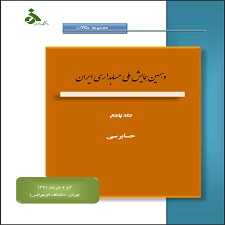توضیحات
ABSTRACT
This paper examines two types of earnings management practices, the techniques employed, the motives behind the practices and the likely good, bad or ugly implications of each. The examination and analysis of this study indicates that earnings management practices based on manager’s personal motives is the ugliest with the worst negative implication. However, the result of the analysis had provided insight that improved disclosure by both managers and management will reduce the risk of bad or ugly practices. It also provided an insight for future research on the implications of various motives behind earning management practices highlighted in the paper.
INRODUCTION
Although earnings management (EM) is permitted by the Generally Accepted Accounting Principles (GAAP) in most jurisdictions, but the motives behind its practices and the techniques employed by most managers makes its practices always suspicious. Conceptually, it is a strong management tool that is used to improve the welfare of the company’s stakeholders if ethically used in line with the provisions of the GAAP. Depending on its motive, earnings management practices can have several implications on the company’s share price and its going concern. While some of the implications are good for the company, others are bad and very ugly as they may result in total winding-up of the company. The problem here is that, this ideal management tool is always linked to manipulations of earnings and fraudulent financial reporting practices like creative accounting and income smoothing; as a result there have been arguments among researchers as to whether earnings management is good or bad. However, this may not always be the case because it is almost impossible in today’s dynamic and challenging business environment to find a company that does not practice earnings management since it is allowed. Contemporarily, there are two key types of earnings management namely; accrual earnings management (AEM) and real earnings management (REM) and each of these have its backing of the GAAP. So, making a general assumption that earning management is always a fraudulent activity is a wrong judgement that affects firms negatively, the focus should rather be on the motives behind the techniques used and the likely outcome of the practice.
چکیده
این مقاله دو نوع شیوه های مدیریت درآمد، تکنیک های مورد استفاده، انگیزه های عمل و دلایل احتمالی خوب، بد و زشت هر یک را مورد بررسی قرار می دهد. بررسی و تحلیل این مطالعه نشان می دهد که شیوه های مدیریت درآمد براساس انگیزه های شخصی مدیر، زشت ترین و بدترین پیامد منفی است. با این حال، نتیجه تجزیه و تحلیل ارائه شده بینش ارائه شده است که بهبود افشای توسط هر دو مدیر و مدیریت خطر ابتلا به بد یا زشت عمل می کند. این همچنین بینش برای تحقیقات آینده در مورد مفاهیم از انگیزه های مختلف در پشت درآمد روش های مدیریتی برجسته در مقاله ارائه شده است.
مقدمه
اگرچه در اکثر حوزه های قضایی، مدیریت درآمد (EM) توسط کلیه اصول حسابداری پذیرفته شده (GAAP) مجاز است، اما انگیزه های عمل و تکنیک های استفاده شده توسط اکثر مدیران، باعث می شود که شیوه های آن همیشه مشکوک به نظر برسد. به طور مفهومی، این یک ابزار مدیریت قوی است که برای بهبود رضایت ذینفعان شرکت مورد استفاده قرار می گیرد اگر از لحاظ اخلاقی مطابق با مفاد GAAP استفاده شود. بسته به انگیزه آن، شیوه های مدیریت درآمد می توانند بر قیمت سهم شرکت و نگرانی خود تاثیر بسزایی داشته باشند. در حالی که برخی از دلایل این امر برای این شرکت خوب است، دیگران بد و بسیار زشت هستند، زیرا ممکن است به پایان برسد. مشکل اینجاست که این ابزار مدیریت ایده آل همیشه با دستکاری درآمد و روش های گزارشگری مالی مالی مانند حسابداری خلاق و هموار سازی درآمد ارتباط دارد؛ به عنوان یک نتیجه در میان محققان بحث وجود دارد که آیا مدیریت درآمد خوب یا بد است. با این حال، این ممکن است همیشه به این دلیل باشد که در محیط کسب و کار دینامیک و چالش انگیز امروز تقریبا غیرممکن است که شرکتی را پیدا کند که مدیریت درآمد را از آن مجاز نگذارد. در حال حاضر، دو نوع کلیدی از مدیریت درآمد وجود دارد؛ مدیریت درآمد تعهدی (AEM) و مدیریت درآمد واقعی (REM) و هر کدام از اینها حمایت از GAAP را دارند. بنابراین، یک فرض کلی که مدیریت درآمد همیشه یک فعالیت جعلی است، یک قضاوت غلط است که بر شرکت ها منفی است، بلکه تمرکز باید بر روی انگیزه های تکنیک های استفاده شده و نتایج احتمالی عمل باشد.
Year: 2014
Publisher : ELSEVIER
By : Normah Omar , Rashidah Abdul Rahman, Bello Lawal Danbatta, and Saliza Sulaiman
File Information: English Language/ 9 Page / size: 202 KB
Only site members can download free of charge after registering and adding to the cart
سال : 1393
ناشر : ELSEVIER
کاری از : نورما عمر، رشیدا عبدالرحمان، بلو لاوال دنباتا و سالیلا سلیمان
اطلاعات فایل : زبان انگلیسی / 9 صفحه / حجم : KB 202


![Management disclosure and earnings management practices in[taliem.ir]](https://taliem.ir/wp-content/uploads/Management-disclosure-and-earnings-management-practices-intaliem.ir_.jpg)
![Water accounting for stressed river basins based on water resources[taliem.ir]](https://taliem.ir/wp-content/uploads/Water-accounting-for-stressed-river-basins-based-on-water-resourcestaliem.ir_.jpg)
![Teaching managerial responsibilities for internal[taliem.ir]](https://taliem.ir/wp-content/uploads/Teaching-managerial-responsibilities-for-internaltaliem.ir_.jpg)
![EFFECTS OF ENVIRONMENTAL AUDIT AND ECONOMIC SUSTAINABILITY[taliem.ir]](https://taliem.ir/wp-content/uploads/EFFECTS-OF-ENVIRONMENTAL-AUDIT-AND-ECONOMIC-SUSTAINABILITYtaliem.ir_.jpg)

![A case study of critique Critical perspectives on critical[taliem.ir]](https://taliem.ir/wp-content/uploads/A-case-study-of-critique-Critical-perspectives-on-criticaltaliem.ir_-150x150.jpg)
![Impact of regulatory framework and environmental factors on[taliem.ir]](https://taliem.ir/wp-content/uploads/Impact-of-regulatory-framework-and-environmental-factors-ontaliem.ir_-150x150.jpg)
نقد و بررسیها
هنوز بررسیای ثبت نشده است.